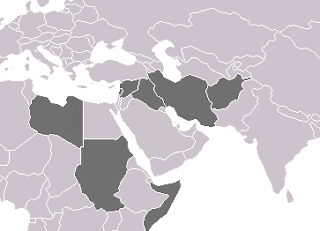I've been spending some time thinking about the decline of the American Empire, and putting it in the context of recent world events. Bear with me for a brief economic history of the past forty years, a little more in-depth review of the past seven, and a sobering prognosis.
 Peak oil
Peak oil in the United States happened before 1970, and it has been a long ride downhill. The United States' domination of the world in the 20
th century was based on oil, and when it started depending on oil imports, things started to go wrong.

The
1973 Arab oil embargo underlined this problem. Our prescient president Jimmy Carter put on a sweater and set sheep to graze on the White House lawn, but he was
ineffective in his quest to convince the American people that energy independence was critical: they were in denial as global oil production per capita reached its peak in 1979, and they elected Ronald Reagan.

Reagan made people feel better, and they soon forgot about the whole energy mess – for a generation. Cars got huge, and then even huger, and oil remained relatively cheap. But the demographic shift worldwide set up massive structural problems that couldn't be ignored, at least not by the ruling class. They understood that trouble was coming quickly, and groups such as the
Project for the New American Century set up plans to counter these shifts.

After the media and the Supremes pushed their man into power in 2001, the neocons were in their springtime. Dick Cheney's
energy task force made tactical plans, as the Bush administration had already
decided to invade Iraq.
I'm not going to get into the entire September 11th thing. If you choose to open that door and reconsider what you saw that day and try to match it up with what you've been told since, I
guarantee you won't like it. Whatever its cause, that convenient crisis was used as the launching point for a campaign fulfill a clear agenda: the United States sought to seize control of middle eastern oil.

Afghanistan was just the preamble. The Plan, as outlined by Gen. Wesley Clark (ret.):
seven more countries in five years: Iraq, Syria, Lebanon, Libya, Somalia, Sudan, Iran. You will note that those countries bracket the largest proven oil reserves in the world. The notable oil producing country that isn't mentioned in the list (Saudi Arabia, a nominal US ally whose shaky kleptocracy has
close ties to the US élite) would end up pretty much surrounded. If your goal is to establish military domination over a region, this looks like a very good plan.
The invasion and occupation of Afghanistan has had many conflicting justifications and pretexts, among them Osama Bin Laden (who is
in Pakistan, and who
isn't important anymore); the status of women (which was only a priority for a
hot second) and finally, the scary Taliban (unless and until the US can make a deal with them – then all is forgiven.
Again.) But really, Afghanistan is now simply a convenient location for military bases (strategically placed around a certain
strategic asset) next to two
problematic countries.
Discussing the justifications floated for the invasion of Iraq would take more time than I want to devote to it, but between the
weapons of mass destruction,
Al-Qaeda links, spreading
freedom,
massacres,
rape rooms, spreading
democracy, and other altruistic and high-sounding bullshit, none of them tend to last more than six months. The longest lasting reason so far has been
obstinate tenacity. That is unrealistic as a basis for foreign policy. At the very least Iraq continues to present plenty of convenient opportunities to rattle the sabre at Iran.

All war is economic, both in motive and in execution. The US imperial machine is
out of gas: the US dollar is tremendously depressed, and by many accounts teetering on the verge of collapse. The US economy is sputtering. The political élite which started this adventure is discredited and unable to convince anyone to carry it further. A resurgent Russia now stands prepared to defend its interests in its neighboring sphere, buoyed by the rocketing price of petroleum. It turns out that the USSR didn't collapse because of Reagan's
force of personality: it
collapsed because Saudi Arabia flooded the market with cheap oil. That no longer holds true: we are now in or around worldwide peak oil. Refineries are at capacity, but no new refineries are planned – ever again.
This is really, really bad news for the United States. The Terror War for Oil was conceived as the last chance to sustain American hegemony, supplying the energy to hold the country over until new technologies become available (or at least until the Baby Boomers die). But it failed, and now the US is broke, mired in an anthill, and beset by competition from countries with younger,
larger, and
better educated populations, with
larger supplies of oil,
more effective governments, and more
dynamic economies.

Which is not to say that the United States is a bad place, or that it will be worse than other places. On the contrary, it will probably do reasonably well once it extricates itself from some
current difficulties. But it will never rule the roost again, and Americans are going to have to learn to shed the myth of
American exceptionalism. The tank is empty, and the US will have to learn to wait in line at the gas station just like everybody else.
 To expect the media to cover this trend would be naïve: they depend on the largess of corporate advertisers. To expect food merchants to properly educate the public is clearly not in their self interest. To expect politicians to do anything would be equally naïve: they won't even allow the prohibition of known poisons from food without extreme pressure, and they have campaign fundraising to worry about. The judiciary and the civil service may try to do the right thing, but they are routinely stymied. If we can't trust the labels, maybe we shouldn't buy their crappy packaged food at all.
To expect the media to cover this trend would be naïve: they depend on the largess of corporate advertisers. To expect food merchants to properly educate the public is clearly not in their self interest. To expect politicians to do anything would be equally naïve: they won't even allow the prohibition of known poisons from food without extreme pressure, and they have campaign fundraising to worry about. The judiciary and the civil service may try to do the right thing, but they are routinely stymied. If we can't trust the labels, maybe we shouldn't buy their crappy packaged food at all.



 Here's a story: China reinvents its nation, and in the process uses new technology to build "Totalitarianism 2.0" à la Orwell. Klein sketches a scary picture, draws disturbing parallels and connections with the U.S. government, and points out some nasty trends in our not-so-free society.
Here's a story: China reinvents its nation, and in the process uses new technology to build "Totalitarianism 2.0" à la Orwell. Klein sketches a scary picture, draws disturbing parallels and connections with the U.S. government, and points out some nasty trends in our not-so-free society.
 Ruby on Rails was initially blamed for the problems a year ago, then
Ruby on Rails was initially blamed for the problems a year ago, then 








